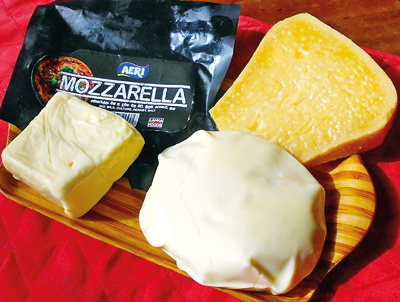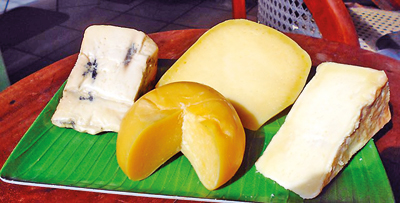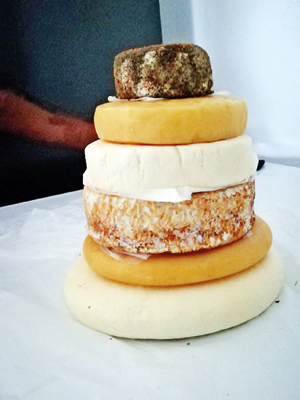Say cheese, Lankan style

Mozzarella and Maiajano
The influence of tourism and the changing tastes of Sri Lankans have resulted in a growing demand for cheese. But cheese is not indigenous to Sri Lanka and was probably introduced here by Dutch and British colonisers, since it preserved well during the long voyage from Europe.
Cheese is a dairy product derived from milk (of cows, goats, sheep) and is formed by a coagulation of the milk protein casein by adding the enzyme rennet, or a vegetarian alternative. There are well over a thousand different cheeses in the world. Cheese is valued for its portability and long life as well as for its distinctive taste, although taste differs according to the origin of the milk and the animal’s diet, as well as the skill of the cheesemaker.
As a turophile (cheese aficionado) with a penchant for enjoying a platter of cheese as the finale of a good meal, I embarked on a culinary quest to find natural cheeses handmade in Sri Lanka. I sought alternatives to the processed slices and foil wrapped wedges that masquerade as cheese on supermarket shelves.
Probably real cheese was first made in Sri Lanka by colonial wives in the kitchens of hill country bungalows, utilising milk from the plantation’s farm.
One of the pioneers of the commercial manufacture of cheese was Nel Farms, the brand name for Noorani Estates Ltd incorporated in 1942, which by 1974 was focussing on poultry production and dairy farming. I recall buying blocks of cheddar-type cheese from its outlet in Colombo in the 1980s.

Blue, Cheddar, Bree and Smoked Mozzarella
The main commercial producers of cheese today are Kotmale (a Cargills’ company) which produces both natural and processed cheeses, and companies associated with New Zealand Farms at Ambewela.
Ambewella Products Ltd produces premium quality cheese from the finest dairy farms in Sri Lanka using pasteurised cow’s milk, salt, microbial rennet, permitted food additives and lactic acid culture. It is sold as thick slices hewn from a block or in balls wrapped in red wax and rind. One variety is billed as a Gouda cheese and matches the original Dutch model in flavour and texture. Flavoured ball cheeses, such as one with mustard seed, have an extra kick.
Ball cheeses are also a popular Kotmale company product as is the company’s Edam, with a bland taste that appeals to the cautious Sri Lankan palate. Their Feta cheese, however, is not authentic as only cheese made the traditional way from sheep’s or goat’s milk in certain areas of Greece, can be called Feta. But since Sri Lanka is not part of the European Union, the name is used to describe a white, crumbly cheese, made here from cow’s milk, in large blocks submerged in brine and then cut into 100g slices and packed in a plastic bag containing brine. It is harder and saltier than the Greek version.

Novel concept: A cheese wedding cake
The most famous cheese is Cheddar. It is the most widely purchased and eaten cheese in the world and is always made from cow’s milk. The name comes from Cheddar Gorge in Somerset, England, where cheeses were matured from the 16th century in natural caves. There is no copyright on the name or the taste (as there is with Feta) and any hard and natural cheese that has a slightly crumbly texture and a sharp taste is often marketed as cheddar.
When I bought a packet in my local supermarket of the local Aerie brand of cheddar, I was perturbed that it barely resembled traditional cheddar. It was tangy, but creamy, not hard, in texture and pale instead of the usual golden yellow. So I contacted Jezeem Jameel, the genius behind the production of Aerie cheeses, and suggested that to avoid disappointing those expecting a traditional cheddar cheese density and texture, he should distinguish his product, by calling it “Ceylon Highland Cheddar.” To my amazement, he did. It’s a good and versatile cheese produced with dedication in the company’s cheese kitchen at Gampola.
Jezeem Jameel became fascinated by the cheese making process when he used to fly regularly to Europe (he was an airline steward at the time) and visited artisanal cheese makers. Their organic approach using natural materials made him realise that he could probably make cheese in Sri Lanka. He learned by trial and error and now successfully produces a variety of cheeses under the Aeri brand, without using any artificial colours, flavours or preservatives. From selling his cheese at a market stall in Colombo he has expanded to supplying supermarkets with his genuine artisanal cheeses including mozzarella and paneer as well as his own version of cheddar.
Following on his heels is a company known as Maia Cheeses which originated in Goa in 2005 opening a branch here in 2016. The Master Cheesemaker (and CEO) is Maia Donadze who was born in Georgia and runs the company with his partner Sheriozha Anthony Wijekoon. Maia manufactures his own branded cheeses in the foothills of Madipola, Matale, using milk purchased from local famers. His aim, he says, is to make available the finest, artisanal cheeses handmade in Sri Lanka for sale direct to customers on line and delivered promptly by courier.
His cheeses are unique in Sri Lanka as they are made with just full fat milk and no culture. He uses only vegetable rennet allowing the cheeses to develop their own flavour. One of his popular cheeses is the delicious Smoked Mozzarella. He says:“In Georgia where I come from we call this cheese Sulguni. It is dried for some time and then smoked on walnut shells. Here in Sri Lanka I smoke the cheese over coconut husks.”
All the Maia cheeses I tasted have a distinctive tang to them and my favourite is the nutty Maiajano, a Parmigiano-Reggiano style cheese that commands attention with every bite. The Bree is so named because it is dryer and harder than a French Brie, and not creamy, but its evocative taste is exceptional. Maia Cheddar conforms to cheddar traditions in bite and texture.
Maia was recently asked to create a special cheese wedding cake for a Sri Lankan couple. He opted for mild cheeses suitable for the Sri Lankan palate, creating a tower of Mozzarella, Smoked Mozzarella, Bree, Cheddar, Feta and Spicy Feta. This novel cake of cheese proves that artisanal cheeses made in Sri Lanka are at last coming of age.


